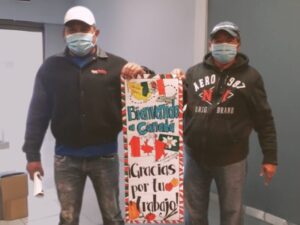Humanized Globalization: Solidarity with Indigenous Peoples and Migrant Workers from Guatemala to Canada. A conversation with Bishop Ramazzini
“ This gathering is an expression of our desire to humanize globalization. I want to thank you for that”.
This is how Bishop Ramazzini from the Roman Catholic Diocese of San Marcos in Guatemala, began his talk to a group of 20 –25 people gathered at KAIROS on September 29, 2010. The presentation covered key issues related to KAIROS’ programs from Indigenous peoples and migrant workers rights to mining and ecological destruction.
We heard how poverty, political corruption, impunity, weak state institutions and corporate greed affect the most vulnerable in Guatemala: Indigenous people and peasants. Their rights are violated, their lands sold and exploited without their consent. There is an increase in violence tied to organized crime and a rise in gangs or “maras”, as they are known. Bishop Ramazzini emphasised that extreme poverty is the root cause pushing young Guatemalans into gangs.
How different or similar are the Canadian and Guatemalan realities? What role do Canadians play in what is happening in Guatemala? Bishop Ramazzini explained that right to free, prior and informed consent is violated when Canadian mining companies are allowed to operate in Guatemala despite the Indigenous people’s opposition to mining. Mayan communities have clearly stated their opposition to mining because of what it is doing to ecology and their ancestral lands. Despite this community opposition, despite recommendations from the United Nations and the Inter American Human Rights Commission that the mine cease operations, mining activities continue.
Bishop Ramazzine spoke of agricultural workers who don’t even get paid minimum wage, have no vacation, don’t have health insurance, no pensions and have to live and work in inhumane conditions. This picture doesn’t look good, does it? Unfortunately migrant agricultural workers, many of them from Guatemala, face a similar situation here in Canada. Extreme poverty is the main reason why thousands of young people are leaving Guatemala to come and work as temporary migrant workers in Canada and the United States. Indigenous people in Canada are also suffering the consequences of resource extraction and environmental destruction here in Canada.
While Bishop Ramazzini summarized the issues that are at the root of the problems in Guatemala, he also confirmed that in the midst of this, there are positive developments. The resistance to the destruction of the land and the violations of peoples’ rights is not just local. As a result of community efforts, resource extraction and human rights is now a national issue. Another important development is that “civil society organizations are maturing” Bishop Ramazzini said. There is a political maturity and unity amongst civil society groups, which is generating proposals and alternative development models. The result of consultation with communities is a clear “No” to open pit mining. However, people are proposing alternatives. Where there was no coordination, now the people and organizations are coming together to defend their rights.
Bishop Ramazzini noted that the resistance and alternatives must be international as well. Groups and organizations like KAIROS need to play our part. Just as the churches, civil society organizations and communities are pushing for legislative change in Guatemala, KAIROS and churches in Canada need to continue to put pressure on elected officials to pass legislation that will ensure that Canadian companies respect human rights, preserve ecological sustainability and honour the rights of Indigenous communities to determine the type development on their territory. Bill C-300 is just such legislation. We urge Canadians to contact their members of parliament and indicate their support for this corporate accountability bill.












